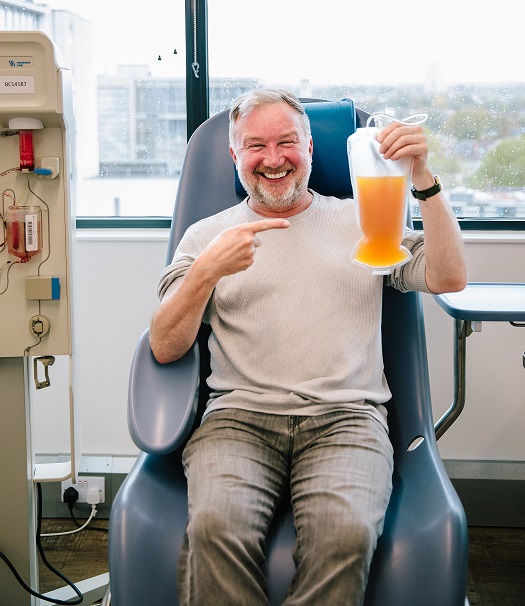Why is my type in demand?
Why A negative, A positive and AB negative platelet donors are always needed.
Platelets from donors with A negative, A positive and AB negative blood types are safe to give to almost everyone. They are constantly needed by hospitals to help people in need.
To understand why platelet donations of these specific blood types are needed, we’ll take a closer look at blood group systems, antigens and antibodies.
Understanding blood type
Your blood type is inherited from genes passed on by your parents. The two most important ways to determine your blood type are the ABO and Rh blood group systems. The ABO system gives us the letter part of your blood type and Rh system gives us the positive or negative part.
Which group you belong to depends on the antigens and antibodies in your blood.
Antigens are a combination of sugars and proteins that coat the surface of a red blood cell. Individuals with blood type A have A antigens, while those with blood type B have B antigens. People with the AB blood type have both A and B antigens, and those with blood type O have neither.
Antibodies are found in plasma, the liquid part of the blood that carries platelets, red blood cells and white blood cells around the body. Antibodies are important when someone receives blood because they are the body’s natural defence system. They recognise anything unfamiliar within your body, including ‘foreign’ antigens from other blood types, and tell your immune system to destroy it.
People with:
- Blood type A produce antibodies against B antigens.
- Blood type B produce antibodies against A antigens.
- Blood type O produce antibodies against both A and B antigens.
- Blood type AB don’t produce antibodies against either A or B antigens.
The D antigen in the Rh system determines whether you have positive or negative blood. If you have the Rh D antigen, your blood type is positive. If you lack the Rh D antigen, your blood type is negative.
When a blood donation is given to someone who needs it, known as transfusion, we need to consider how antigens and antibodies interact with each other.
The presence of antigens on the donated red blood cells is important. A bag of red blood cells has most of the plasma – and therefore antibodies – removed, but still contains antigens.
If someone has antibodies for certain antigen and they receive a blood transfusion containing that antigen, then their antibodies will attack those ‘foreign’ blood cells and break them down. Due to this severe immune reaction, they would very quickly feel unwell and would need immediate treatment to prevent kidney failure and low blood pressure.
What about platelets?
 When it comes to ensuring that platelets from the right blood type are given to someone in need, we also need to think about plasma. This is because a unit of platelets contains more than just platelets – there is plasma too. In fact, around a third of the bag is plasma, the clear liquid part of blood that contains antibodies. These antibodies float around in plasma and can potentially react with antigens they encounter in a patient’s blood, causing a transfusion reaction.
When it comes to ensuring that platelets from the right blood type are given to someone in need, we also need to think about plasma. This is because a unit of platelets contains more than just platelets – there is plasma too. In fact, around a third of the bag is plasma, the clear liquid part of blood that contains antibodies. These antibodies float around in plasma and can potentially react with antigens they encounter in a patient’s blood, causing a transfusion reaction.
If someone receives platelets which include a significant amount of plasma, antibodies may be transfused and ‘attack’ the patient’s corresponding antigens, therefore destroying the patient’s red blood cells.
Individuals with blood type AB are considered universal donors for platelets, since they don’t produce antibodies against either A or B antigens.
AB negative is truly the ‘universal’ type for platelets as it contains no ABO antibodies. However, A negative and A positive types are important too.
A positive and A negative platelets are transfused to people with other blood types because there aren’t many AB negative donors. Only a very small percentage of the population have AB negative blood, so A positive and A negative platelet donors can make a real difference.
Platelets last just 7 days after they’ve been donated so we rely on people to donate regularly throughout the year. One platelet donation can help up to three adults or 12 children.


